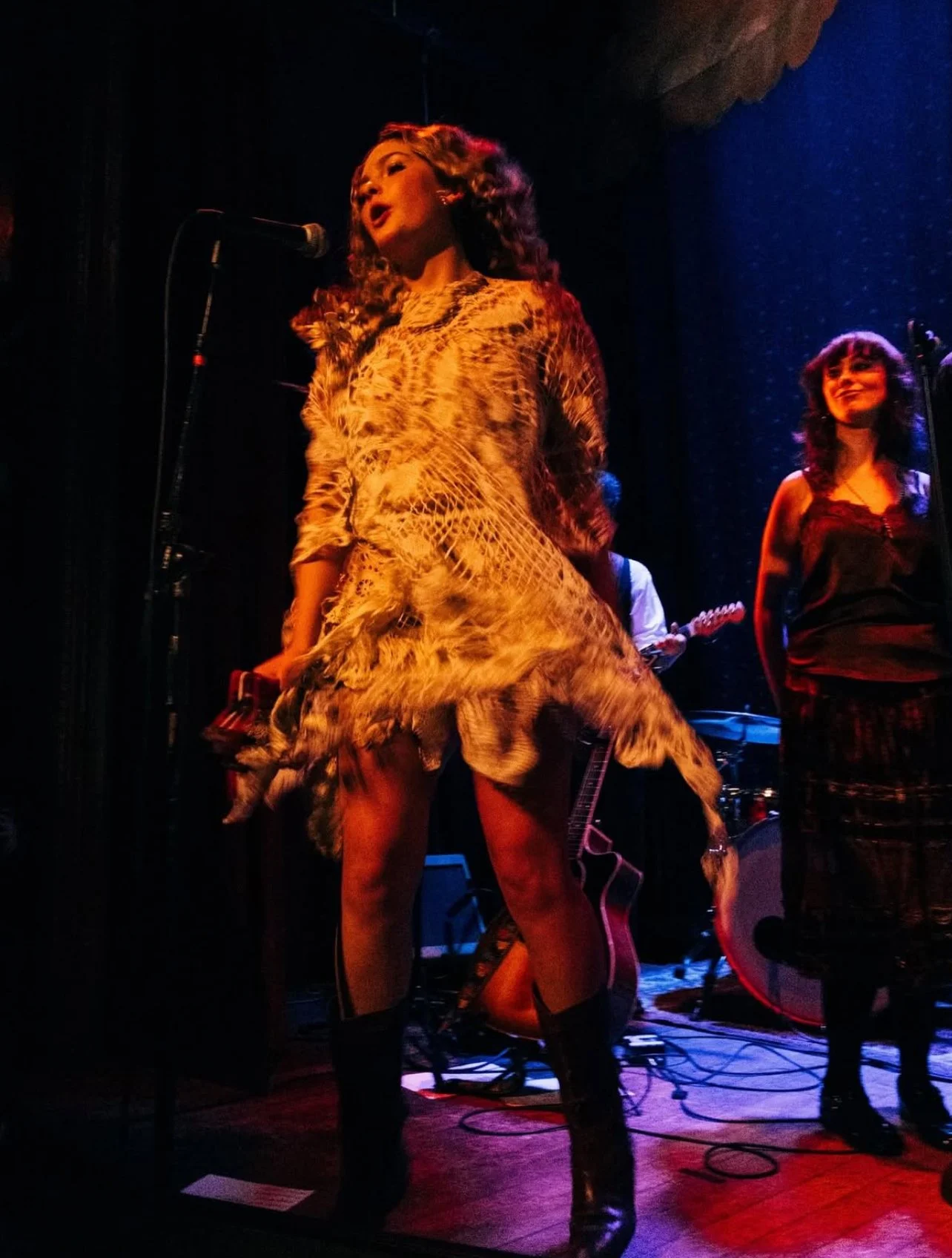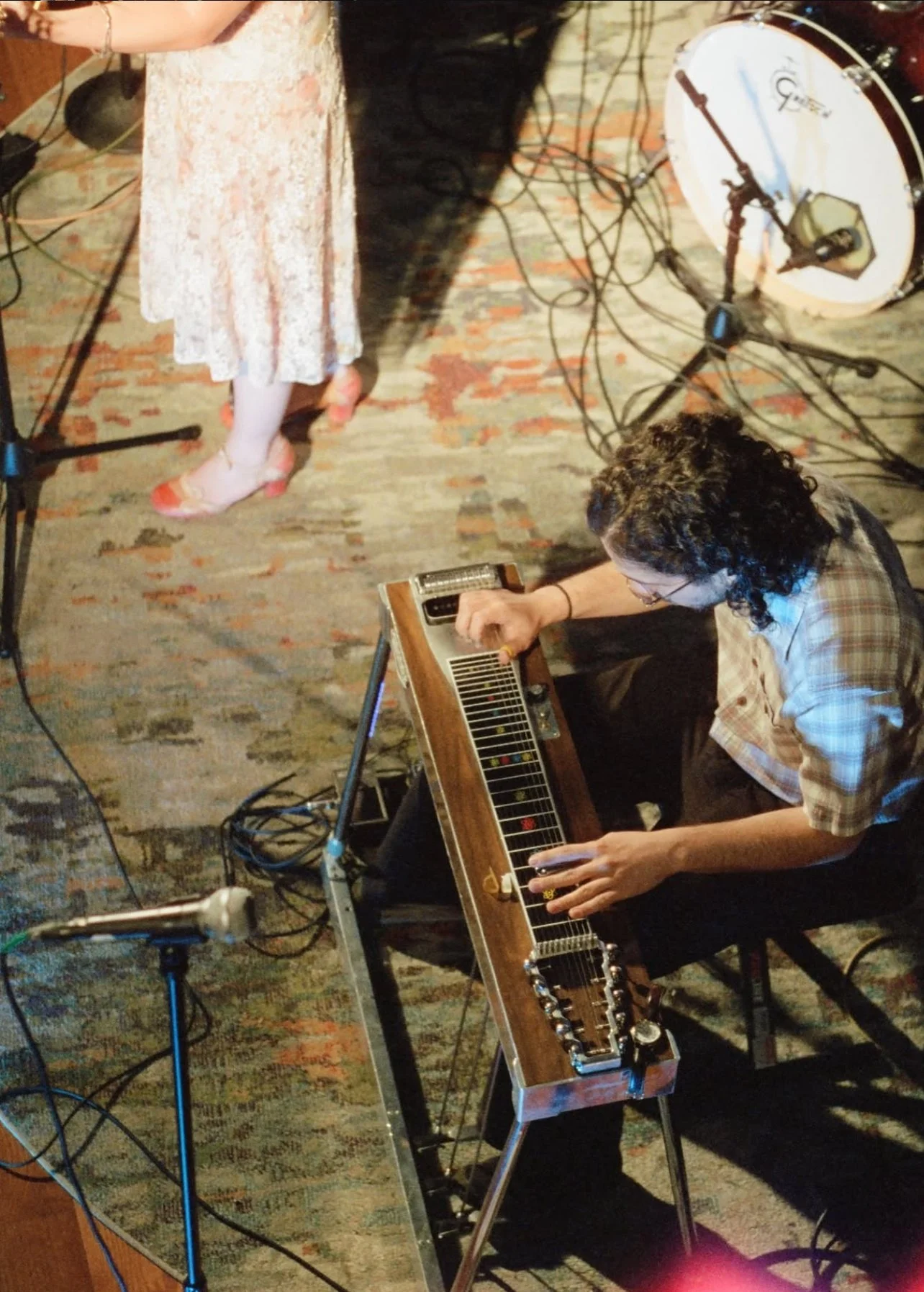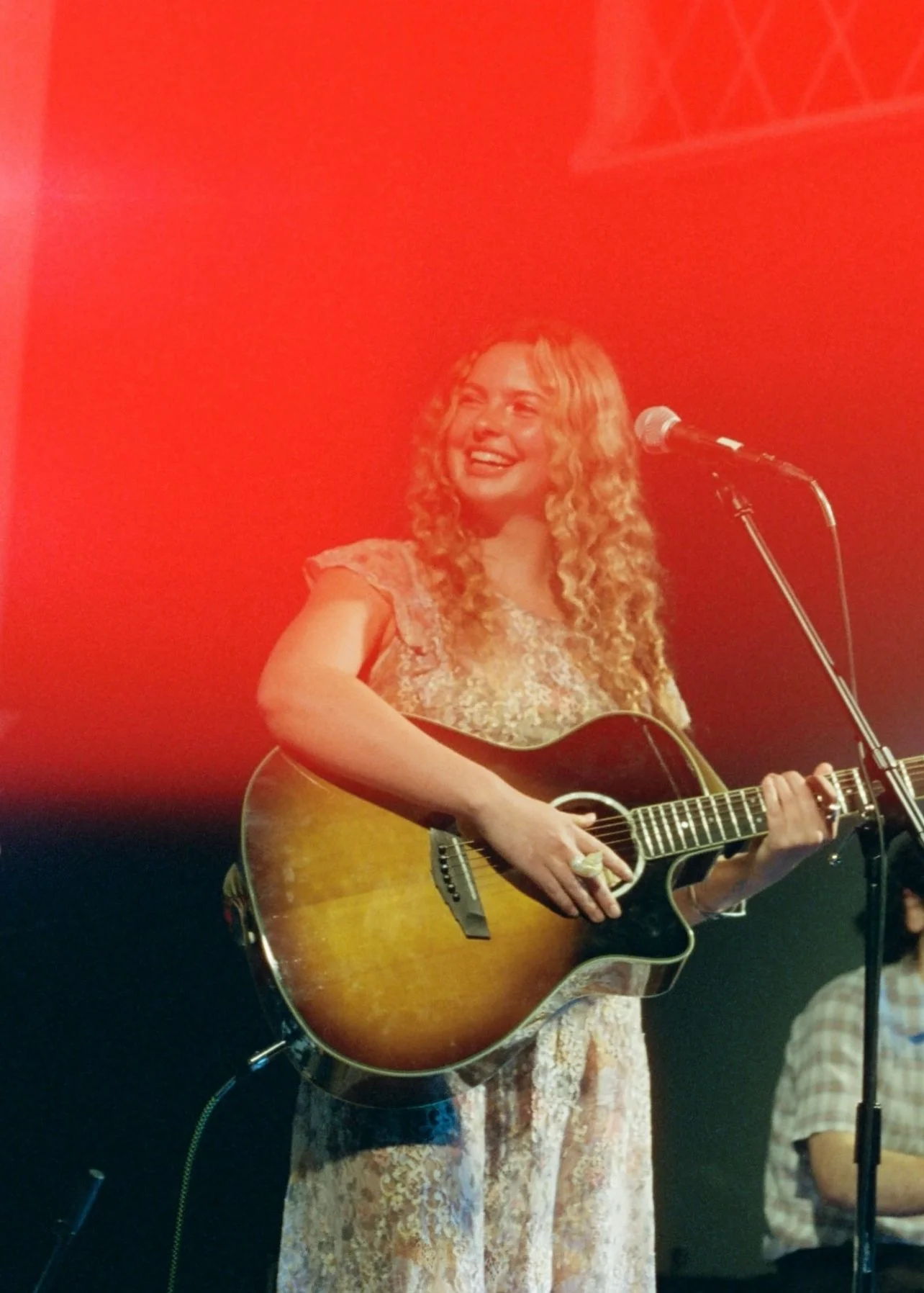THE NEW AGE OF FOLK: ROSE PARADISE
AN INTERVIEW BY GRACE TELEGDY
Rose Paradise, 2025.
Image courtesy of Anna Cappello.
As technology, AI, and all-things-electronic continue to monopolize every landscape, there are a select few who choose to rebel–whether by banishing technology from their homes or a return to tried and tested analog creativity.
Rose Paradise is a contemporary folk artist who is both reviving and reinventing a genre that soothes the soul. Her most recent album, Over The Hill, was recorded live–paying homage to her acoustic foremothers and fathers. The rebellion against electro-oligarchy comes in many forms and Rose Paradise is a shining example of what it means to create naturally and organically in a time of algorithmic absent-mindedness.
Songs that embody “sun-soaked folk and dreamy textures,” Paradise’s music is well-worth the listen.
Year of the Dog, 2023.
Rose Paradise.
Produced by Ben Gordon, Emma Wellons, Lucas Wurman, and Rose Paradise
THE LAB MAG: Could you tell us a little bit about you, your history.
ROSE PARADISE: I grew up in a teeny tiny town in Northern California, an hour outside of San Francisco. My hometown has an incredible community–a mix of hippies and tradesmen, with around a 500-person population. In school, I had twelve classmates, and there were about 100 kids from preschool to eighth grade. My music teacher at school had pulled me and three of my other classmates aside one day in second grade and suggested we start an after-school band. I started on drums and jumped around to every instrument. The program was not structured–we had the freedom and independence to do music the way we wanted to. By the age of eight, I was playing the local open mic every week at the only restaurant in town, The Parkside. If you played music, you could have free all-you-can-eat pasta on Tuesdays. I taught myself piano from YouTube cover tutorials and would play every Tuesday for as long as they would let me. By ten I was writing my own music.
As an only child whose parents worked a lot, I had a lot of alone time and kept myself company with my imagination. Songwriting was the perfect remedy to my loneliness. By fourteen I’d released three albums of original music. My parents, neither of them musicians, were incredibly supportive and helped set me up with local musicians to record my songs. High school was a big shift as it was a thirty-minute commute on the winding road over Mt. Tamalpais, where I was just a little fish in a big pool. Marin County is a wealthy place, and adjusting to the culture was a struggle. My mom, a hard working massage therapist, was the bread winner in the family, and yet, when I got into school for music at NYU, she urged me to go. I had a scholarship, but it was still a big risk to move to New York City at eighteen years old to pursue the arts nonetheless.
In college, I met my band–some of my best friends and collaborators who have inspired me to embrace my instincts. In 2024, I brought them all back to my hometown, where we recorded twelve songs at the studio in town. I'd worked at the studio as a kid and dreamed of bringing my own band and recording my own album there one day. The album, Over The Hill, came out in April and is a tribute to my unorthodox upbringing and the journey I’d made up and over the Mountain that stood between Stinson Beach and the rest of the world as I knew it.
Rose Paradise, 2025
Image courtesy of Hellen Elizondo
THE LAB MAG: What brought you to pursue folk music? Was there an awakening moment of inspiration?
ROSE PARADISE: The Bay Area has an incredibly rich musical history. In the 50s, folk artists like Joan Baez played coffee shops in San Francisco and in the 60's, the Bay Area was the epicenter of the counterculture movement with bands like the Grateful Dead, and singers like Janis Joplin. My parents had a great taste in music and would play Dylan, Gillian Welch, Crosby, Stills & Nash, and other artists on CD.
I think what primarily drove me to make folk music was my environment. Stinson Beach is where the great Pacific Ocean meets the mountains. A thick fog rolls in most of the year, covering the town in a dewy blanket. We share the town with the wildlife–coyotes, deer, mountain lion, seals, and hawks who call Marin their home. It’s hard not to be drawn towards themes of nature, life cycles, and seasons when you’re surrounded by this kind of beauty. Folk music, to me, is story telling. One of the first songs I ever wrote was called “Pacific Blue.” I’d written it after a fin whale had washed up on Stinson Beach after being hit by a boat. It was alive, and the whole town gathered around, cheering and waiting for help to arrive, hoping the tide would come up high enough to wash the whale back into the ocean. The whale never made it back into the ocean and died there on the beach. It was the first death I witnessed, and it really impacted me. My writing usually happens after an intense experience or emotion I have.
THE LAB MAG: Is there a song or album from your upbringing that continues to influence you today?
ROSE PARADISE: Crosby, Stills & Nash’s self-titled album is a huge influence. The emotionality and nostalgia in their sound brings me back to my younger self. The way they use harmony feels warm and yet unconventional. I love using harmony in my music–when done right, it sparks a flame in the pit of my stomach.
Tangerine, 2024.
Rose Paradise.
Directed by Weston Borg, produced by Asha McGee, assisted by Sofia Borg.
THE LAB MAG: How do you think folk and folk rock is received today? What has your experience been?
ROSE PARADISE: I think folk, Americana, and country are having a huge resurgence right now. With the state of the world in all its disarray and dysfunction, people are turning to music that they can cling to and feel something with. To hear a story that resonates, unearthing bottled up emotion, is a gift that a song can give to us.
It’s been an interesting past five years in NYC being a folk artist. At first, I had a really hard time finding my place, and the lack of physical spaces for music to live because of COVID left me feeling lost. The last few years, I learned a lot from the rock scene that I found myself in. The performers and shows I’ve seen in the city–the raw energy harnessed on stage–have been captivating, and I've learned to lean into my own vigour when I can. I see a lot more folk acts popping up in New York and have been uncovering pockets of existing musicians that I admire and have excited me living here.
THE LAB MAG: In the age of technology, rapidly advancing AI, and electronic supremacy–how do you see folk music persisting? Why do you think we continue to return to the warmth of the acoustic sound?
ROSE PARADISE: Where music made with technology is the mainstream today, folk and acoustic sound is a counterculture. I think more than ever people are seeking authenticity and folk music is a lifeline.
Rose Paradise, 2025.
(L-R) Image courtesy of Anna Cappello and Hellen Elizondo.
THE LAB MAG: Could you tell us a bit about your most recent album, Over The Hill?
ROSE PARADISE: Over The Hill has been my whole life for the last year. I wrote the songs over the past three years. I went through a period of time where I wasn’t feeling happy with the songs I’d been writing, and during my time in Berlin studying music, I was able to regain some sense of freedom in my musicality. I picked up guitar four years ago, and this album holds some of the first songs I’d written on guitar, whereas in the past I’d only written on piano. With my band, Lucas Wurman, Emory Wellons, and Ben Gordon, I’ve been playing these songs live the last few years–getting a sense of how I wanted them to sound. They helped bring their own flare to what I’d written–an incredible benefit to playing with a band of like-minded yet unique people. During this time I knew I wanted to record these songs live with my friends to capture the energy we conjured during our live shows.
During the spring of 2024, after raising money by Go-Funding the album, I took the band back to Stinson Beach to record the album. We spent seven days in the studio recording the songs, co-producing them together. A couple of my friends, Naomi Baraban and Max Woobs, came in to play on the record, and my friends, Tom Brecker and Ben Gordon, engineered the record. It was such an intense experience to get twelve songs done in such a short amount of time. We tracked the songs live with guitar, drums, bass, and vocals in full takes. The process of being in charge, the self placed pressure of doing it right, and getting it done was hard on me.
Working with friends is a beautiful, emotional process—a delicate dance that, in the end, creates raw, honest songs infused with everyone’s heart and soul.
After getting back to NYC, we spent the next eight months overdubbing before sending them off to get mixed. The mixer, Daniel Neiman, and I did up to eight mix passes on each song. I spent this period of time walking around New York with the song in my ears or in the car, making meticulous notes, a soundtrack to my life. We put the project out in April of 2025 and had an album release show at Slipper Room in the Lower East Side, where the musicians on the album got to relive the live experience in front of an audience.
THE LAB MAG: Why did you choose to live-record your album? How does this contribute to your intentions as a musician?
ROSE PARADISE: I love how music from the past makes me feel. Mistakes in recordings can be my favorite part of some of my favorite songs. It’s human and real. I love playing live–feeding off of each other's energy, getting small and exploding. I didn’t want to think too hard during the recording process.
There’s a million ways you can sing or play a song, and I wanted to capture what felt right in that time and place.
Over The Hill, 2025.
Album pressed into vinyl.
Music by Rose Paradise accompanied by Naomi Baraban, Jason Altchuler, Max Woobs, Jenna Pascale, Huxley Kuhlmann, Lily Goldberg, Eva Alejandra, Abby Cole, and Elliot Gorham.
Album art by July Guzman.
Vinyl design by Anna Capello.
THE LAB MAG: Who is your favorite musician?
ROSE PARADISE: Lucinda Williams is my favorite right now. I grew up on a lot of her music, and her story telling is honest, fierce, and shameless. She leaves her heart on her sleeve, but is a real rocker. I read her memoir last year, and I found her story impactful–she wasn’t living off her music until later in her life. But she kept writing, even when she was turned away, she kept writing. Now, her legacy lives in Americana music. I got the chance to see her live last week in her new club, Lucinda’s, in the East Village. The club used to be Heaven Can Wait–a venue I’ve played many times. Seeing her in an intimate space like that was unforgettable.
Over The Hill, The Film, 2025.
ROSE PARADISE’S ALBUM, OVER THE HILL, IS OUT NOW.
LISTEN TO HER HAUNTINGLY BEAUTIFUL AND MELODIC MUSIC WHENEVER AND WHEREVER YOU CAN.
SHE IS ACCOMPANYING THE WILDMANS IN AUGUST, PLAYING SHOWS ALONG THE EAST COAST.
very laboratory






